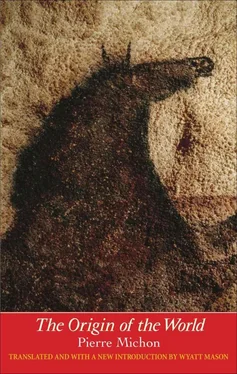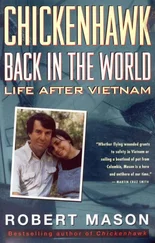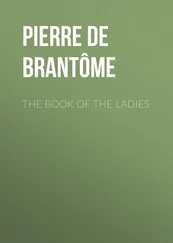Afterword: Notes from Underground by Roger Shattuck
In The Origin of the World , an unnamed narrator arrives by bus in the little town of Castelnau in the Dordogne region of high plateaus and deep ravines close to the prehistoric underground sites of Les Eyzies and Lascaux. The Michelin regional map number 75 locates Castelnaud (with a final d ) on the Dordogne River. Michon moves Castelnau (without the d ) twenty kilometers away, to the banks of the smaller Beune River, quietly opening the space for fiction and for legend.
I arrived at night, in something close to shock, in the middle of a galloping September rain that bucked in the beams of the headlights, in the pounding of the long windshield wipers; I couldn’t see the village at all, the rain was black. I took a room Chez Hélène , Castelnau’s only hotel, perched on the lip of the cliff beneath which the Beune flows: that night, I couldn’t yet see the Beune, but leaning out the window of my room, I was just able to make out a hollow in the darkness behind the hotel.
From the dusty display cases in his elementary classroom the narrator learns about the treasures found in the caves and grottoes of the region. The fishermen in the bar talk about their pale mysterious catches from deep-flowing streams. And in the local tabac , where he buys cigarettes and a daily newspaper, the narrator becomes spellbound by a taciturn, statuesque shopkeeper in her thirties. Her son, Bernard, is in his class. In the narrator’s overheated imagination, Yvonne yields herself completely to him, and he guts her brutally like a fish. But reality follows a different course. At appointed times she ventures out across wet fields in high heels to visit a local lover. The narrator encounters Yvonne one evening returning to the shop. She is unable to hide a bleeding wound on her cheek and neck, evidently inflicted by a whip. They stand speechless at the edge of a wood.
The queen was at the bottom of the field, high-heeled like a crane, naked beneath her furbelows, like a scaled fish. Her hips were moving. I thought about what had made them move even more a little while ago. I thought about her vivacity, her cruel elegance; the arrogance of beauty; the shame that crushed her high-pitched voice; the sound of her cry. I tried to imagine her as Bernard’s mother. The dry bulrushes caressed her ankles, ran her stockings, cut. I felt this in my stomach. Beneath the shadows, beneath the coat, beneath the skirt, beneath the nylons, the earrings, the pearls and the Sunday best, beneath Milady’s braids and gathers, hugging the dark stockings, lay this dazzling daylit flesh where at its whitest I imagined, twenty times over, beaten, received during intense thrusts and punctuated by sobs, the heavy, unanswerable phrase that remained forever redundant, forever jubilant, suffocating, black, the absolute authorship she wore on her face.
Yvonne has been indelibly marked, branded by her owner. “Authorship” in the last line is an audacious translation of “ écriture ” (writing). The principal strand of the story comes to a standstill here, but life goes on. The narrator consoles himself with a girlfriend from a nearby town, and the action moves underground — literally. Their weekend visits to local caves inspire an evocation of our paleolithic ancestors who discovered and decorated these subterranean galleries, “the men who were the gods of these reindeer.” They explore a nearby cave that belongs to Jeanjean, Yvonne’s lover. He guides them with flashlight through endless passageways to a huge room whose walls, when flooded by installed lighting, turn out to be blank, unpainted, unclaimed. “As you can see,” Jeanjean says dramatically, “there’s nothing here.” Somehow the narrator is not disappointed but impressed by the unblemished, undecorated walls:
It was extraordinary. It was bare. It was the cupola of Lascaux at the very moment when the old bachelors had entered it, antlers on their heads, and in the torchlight their hearts had leapt in their chests; when the impeccable expanse of white limestone had been unveiled for them alone.
During the following days, the narrator acts severely, almost cruelly, toward Yvonne’s son, Bernard, his pupil. Toward the end, he confesses the motive behind his unfair treatment, at the same time realizing that the hopelessness of his plan is due to a failed understanding of the place that has shaped Yvonne, of its history:
[W]ithout question I was waiting above all for Yvonne to ask me about these injustices, for her to come to see me. But she wasn’t one of these mothers who bothers with such conventions, who believes that the future of each of us differs according to our scores on a quiz; her love for Bernard was of a much older variety, she didn’t even need to look at my pedantic little marks in red ink, she was from the age of the old bachelors as well: she never came.
The fishermen in the bar bring back a catch of mysterious scaleless leather carp. What is happening? No one seems to know. The waters of the Beune rise ominously. At the end, a great sleep fails over Castelnau. The River Beune flows on.
The Origin of the World is a slender book in length, but not in style and language. In a 1999 interview, Michon stated that a novelist is not bound to invent all his characters. There is already a superfluity of lives in the world, and he cites the philosopher Occam’s principle of parsimony (“Entities should not be multiplied unnecessarily”) to justify a novelist’s using real people as characters. But this parsimony in creating characters does not apply to the use of language. In an earlier interview, Michon acknowledges the expansiveness with which he deploys words: “I cannot write without singing.” Michon’s prose tends to slow down in order to oblige you to hear its rhythms and also to see and touch and smell what is happening beneath it. He strives simultaneously for an opaqueness that calls attention to the verbal coloration of the prose and for a transparency that reveals a “real” sensuous world. In Renaissance painting, such a fusing of surface and depth emerged with the development of glazes — layers of varnish that one both sees and sees through. In his best narrative and descriptive passages, Michon gives the effect of a painter building up his glazes. Out of flatness he creates high relief.
In a book of literary essays, Trois Auteurs (1997), Michon tells us that it was William Faulkner who opened the doors of literature for him. Michon also speaks with respect of Proust, Melville, and Balzac. And from the Symbolist poet Mallarmé, Michon borrows his definition of prose: “There is no such thing as prose. There is only verse with differing degrees of rhythm.”
But for some readers familiar with the twentieth-century French novel, two additional voices will be audible through Michon’s prose: that of Alaine Fournier, in particular his Le Grand Meaulnes (1913), a schoolboy fantasy of escape to a bucolic paradise; and that of Jean Giono, in particular his early Alpine novels of farmers and shepherds whose closeness to the land and to nature gives them a corresponding closeness to the supernatural, to the transcendent. All of these authors, starting with Faulkner, use the coils of their prose style to build up a sense of palpable landscape laden with legend.
“I was in an obscene fable.” The narrator of The Origin of the World lets drop this comment just after he has spotted across a meadow four or five schoolboys who carry a dead fox tied to a pole, following local custom, and just before he encounters the disfigured Yvonne on her way home. He also links his plight to “the arrogance of beauty.” Does the title of the book help us to get to the bottom of these implied obscurities? “The origin of the world” alludes most evidently to the association of the region of France with the ancient appearance of man from the darkness of prehistory into the flickering Paleolithic Era of cave drawings, rudimentary tools, and the magic of the hunt. From these caverns emerged the affirmative impulse that would finally become recorded history.
Читать дальше












